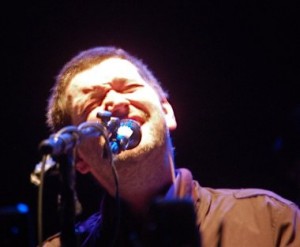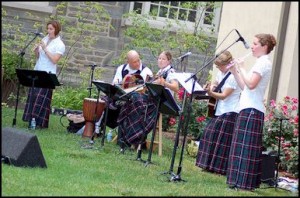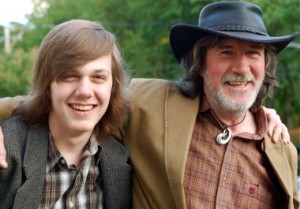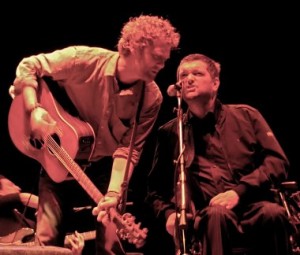
Fergus O'Farrell sings with passion during his Tower Theater performance.
Opening acts don’t get much respect. Audiences who paid good money for the main course tend to linger in the lobby, taking advantage of the hour to suck back a few more Michelob Lites or house Chardonnays till the unknowns clear the stage and the “real” show begins.
All the lobby lizards who missed the band that opened for Glen Hansard and Marketa Irglova (stars of the little Irish jewel of a film, “Once,” performing as The Swell Season) on May 20 at Upper Darby’s Tower Theater will be adding that lapse to their “woulda coulda shoulda” list somewhere down the line.
The people who stayed were captivated, rapt, glued to their seats for the hour that Interference, one of Ireland’s most influential bands for the last two decades (say the musicians, like Hansard, whom they’ve influenced), commanded the stage. When I would occasionally glance down my row, I saw the ultimate compliment an audience can pay a performer. Not applause. Not a standing ovation. Smiles. A brightening of the eye. Body language that echoed the performers’—what experts call “kinesic communication.” Connection. These were the people who were out in the lobby at intermission, lined up at the Interference CD table like the band was selling $2-a-gallon gas.
Interference is that kind of band. In 1988, after they opened for The Hothouse Flowers, a reviewer at the Cork Tribune wrote, “The support act was so powerful you almost forgot who you were there for. . . .Interference positively bewitched the audience.”
At the center of the magic is Fergus O’Farrell, the 41-year-old singer-songwriter with a mesmerizing voice who founded the band with his schoolmate, James O’Leary, when they were at Clongowes College, a Jesuit boarding school in Kildare, from 1983 to 1986 (“James is a ludicrously tall guitar player with unfeasibly thick glasses so instead of sports we did music”). O’Farrell and O’Leary continue to be the mainstays of the band, though an astounding array of musicians cycle in and out. For example, these days on keyboard is Maurice Royscroft—known as Seezer—a Golden Globe-nominated arranger who has collaborated with Gavin Friday on scores for films such as Jim Sheridan’s “The Boxer,” starring Daniel Day-Lewis, and “In America.” Singing backup are Camilla Griehsel Vearncombe, a Swede trained in opera, her husband, Colin Vearncombe whose song, “Wonderful Life,” written when he was performing with the band, Black, was an international hit, and guitarist Paul Tiernan. Hansard, whom O’Farrell has known since their early hand-to-mouth days on the Dublin music scene, has recorded with the band, as have Maria Doyle Kennedy (of “The Commitments”) and her husband Keiran, a guitarist, songwriter, and producer, as well as many others.
If you were a statistician, you might be thinking that probability theory ought to be kicking in right about now. With all that talent, shouldn’t this band be better known? Better yet, shouldn’t they be, as they say in the music business, signed? They’re not. In fact, they’ve taken over the “best unsigned band in Ireland” award from The Hothouse Flowers, whose thunder they stole back in 1988.
Why this is, is complicated, which I discovered when I spent some time with Fergus O’Farrell. If you saw the movie, “Once,” you already know O’Farrell: He’s the dark-haired, bearded man with sky-blue eyes in the party scene, singing his haunting ballad, “Gold” with Hansard. What you really can’t see is that O’Farrell is in a wheelchair. He has a rare form of muscular dystrophy called Emery-Dreifuss, diagnosed when he was almost nine. Most people with MD are dead by the time they’re in their early 20s. O’Farrell’s condition is progressive. He’s been gradually losing the use of his body for 32 years.
Back in the 90s when the band was at the height of its cult popularity in Ireland, several record companies were interested, O’Farrell said. But the wheelchair was like water on a fire. “When they think you’re going to be dead in your 20s, record companies—they’re like venture capital banks. What venture capital bank is going to invest in a company with dodgy foundations?” he said. One friend reported that an enthusiastic executive, once he heard that O’Farrell was in a wheelchair, said, “Blindness works, a wheelchair don’t.”
“Another one told a friend of mine who signed a big deal was told they wouldn’t touch me with a 20-foot barge pole,” O’Farrell said. “Frankly, I think the wheelchair is my USP. My unique selling point. I’m the singing cripple.” He laughs—and it’s not bitterly. O’Farrell is, by his own description, “a half full” kind of guy. And the truth is, it wasn’t just the wheelchair.
“Anyone who has heard our stuff is blown away,” he said. “The problem is we don’t stick to one style. We do jazz, rock, classical. I do what I want to do. Having a limited range doesn’t make sense to me. The record companies want every song to sound similar.”
On the business side of music, eclectic apparently doesn’t work, no matter how great you sound and how slavishly devoted your little clique of fans is. Talent is good, but it’s size that matters. So O’Farrell was left with only a few choices. One was to set up his own recording studio, which he did. With money he got from his father, he created Interference Studio at his home in Schull in West Cork, where he lives with his wife, Li, a practitioner of traditional Chinese medicine.
It was there, in 1994, where Interference recorded its eponymous CD, which was produced and engineered by DanDan Fitzgerald (who does the same for Mary Black). The ten songs included “Gold” and a song he co-wrote with Hansard, “Vinegar Girl.” Critically well-received, it sold well locally. But by 1996, the band had broken up and O’Farrell, while still writing music, took a job at the reception desk of The Eldon Hotel in Skibbereen, which his father owned and was the place where Michael Collins had his last meal before his assassination.
It was O’Farrell’s seven-year dark night of the soul. He had taken a couple of bad hits over the years. Vocal nodules kept him from touring as much as he feels he should have. “When we were first doing gigs in Dublin, I got vocal nodules in both cords and told I couldn’t sing for at least a year and the doctor told me he couldn’t even guarantee I could sing after that,” he explained. “I was really afraid of destroying my voice so I didn’t gig regularly. I would do seven gigs a year. Glen would be doing 200 gigs that same year.”
The same week he was diagnosed with nodules, his MD specialist told him it was time to buy a wheelchair. “He said once you get in it you’ll never get out of it.” Up till then, O’Farrell had been able to walk; he even played football and biked as a child, rode a moped till he was 16, played trumpet, tin whistle, and guitar, until one by one, he had to put them down as he became too weak to play. “It was,” he admitted, “the worst week of my life.”
But by the mid-90s, the MD had also started robbing him of his breath. “My singing style required more air. I sang from my chest with a lot of vibrato, but because of the MD I was getting weaker. I lost confidence,” he said. “Then, oddly enough, something happened at a party at my father’s house.” Someone he met at the party was doing a little beer-soaked singing at 3 AM “and he would break into falsetto when he was going for the high notes he couldn’t reach. And it was lovely. Neil Young sings the same way, so I started developing that and it worked great.”
But he credits Hansard and his Interference band mates with helping him get back into music fulltime again. “They never let me forget I was great,” he said, even when he allowed himself an occasional wallow over how little money there is in greatness. An Interference reunion in Schull led to an invitation for the band to appear on the RTE TV series, “Other Voices,” featuring lesser known Irish talents, and hosted at a deconsecrated church in Dingle by Hansard. Then came the phone call from Hansard. “He usually texts me, so when he calls I know it’s something wonderful,” said O’Farrell. It was about that unforgettable love song that O’Farrell wrote called “Gold.” Hansard’s old bandmate, John Carney, was making a movie about an Irish busker (Hansard) who meets a young woman from the Czech Republic (Marketa Irglova) on Grafton Street and the ambiguous relationship they develop. Could O’Farrell perform “Gold” in the movie? It was one of Hansard’s favorites.
O’Farrell could. He was over the moon. Though it was a low budget film (they did it for about the price of a down payment on a McMansion) and no one was prophesying that it would win a Grammy and an Oscar (which it did), and O’Farrell wasn’t going to make any money from it, “Jesus thank Christ I said I’d do it,” he said. “For that scene we went to Glen’s house, had dinner then a sing-song and they filmed it, pure drop.”
The rest isn’t history. There’s really no telling what it will all mean to Interference and O’Farrell. The music business is a strange thing. People with little talent and lots of marketing can make millions (and get their own regular segment on Access Hollywood); others with enviable ability can slog along for years making so little they need a day job.
Hansard and Irglova brought the band to the US to open for them at sold-out shows at Radio City Music Hall and at the Tower. It was the first time the band has performed in the US. “Imagine, my debut was at Radio City,” O’Farrell marveled. In July, they’ll return to participate in a presentation of “Peter and the Wolf,” updated by Maurice Royscroft at Bard College in New York’s Hudson River Valley. O’Farrell will record the narration and Interference will perform. There’s talk of a gig at World Café. Another CD is in the works.
But there’s something about Interference you need to know. The band doesn’t rehearse. Not really. At one gig, O’Farrell told me, “I just told them what key it was in and they improvised. “
So whatever happens, O’Farrell will probably improvise. It would be a shame if the group didn’t gain a wider audience. Not so much for O’Farrell—he’d get by—but for the millions who are being robbed of the experience of hearing the kind of music you can’t get out of your mind because it takes a foothold in your soul. There are already a few hundred people I know of who were glad they weren’t out in the lobby waiting for the main event. They wisely knew that it had already started.




